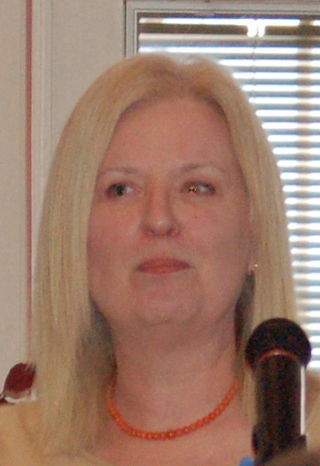Related Research Articles
Marbury v. Madison, 5 U.S. 137 (1803), was a landmark U.S. Supreme Court case that established the principle of judicial review in the United States, meaning that American courts have the power to strike down laws and statutes that they find to violate the Constitution of the United States. Decided in 1803, Marbury is regarded as the single most important decision in American constitutional law. The Court's landmark decision established that the U.S. Constitution is actual law, not just a statement of political principles and ideals, and helped define the boundary between the constitutionally separate executive and judicial branches of the federal government.
A precedent is a principle or rule established in a previous legal case relevant to a court or other tribunal when deciding subsequent cases with similar issues or facts. Common-law legal systems often view precedent as binding or persuasive, while civil law systems do not. Common-law systems aim for similar facts to yield similar and predictable outcomes, and observing precedent when making decisions is the mechanism to achieve that goal. Common-law precedent is a third kind of law, on equal footing with statutory law and subordinate legislation in UK parlance – or regulatory law. The principle by which judges are bound to precedents is known as stare decisis.

In United States constitutional law, the political question doctrine holds that a constitutional dispute that requires knowledge of a non-legal character or the use of techniques not suitable for a court or explicitly assigned by the Constitution to the U.S. Congress, or the President of the United States, lies within the political, rather than the legal, realm to solve, and judges customarily refuse to address such matters. The idea of a political question is closely linked to the concept of justiciability, as it comes down to a question of whether or not the court system is an appropriate forum in which to hear the case. This is because the court system only has the authority to hear and decide a legal question, not a political one. Legal questions are deemed to be justiciable, while political questions are nonjusticiable. One scholar explained:
The political question doctrine holds that some questions, in their nature, are fundamentally political, and not legal, and if a question is fundamentally political ... then the court will refuse to hear that case. It will claim that it doesn't have jurisdiction. And it will leave that question to some other aspect of the political process to settle out.

The American Law Institute (ALI) is a research and advocacy group of judges, lawyers, and legal scholars established in 1923 to promote the clarification and simplification of United States common law and its adaptation to changing social needs. Members of ALI include law professors, practicing attorneys, judges and other professionals in the legal industry. ALI writes documents known as "treatises", which are summaries of state common law. Many courts and legislatures look to ALI's treatises as authoritative reference material concerning many legal issues. However, some legal experts and the late Supreme Court Justice Antonin Scalia, along with some conservative commentators, have voiced concern about ALI rewriting the law as they want it to be instead of as it is.
Critical legal studies (CLS) is a school of critical theory that developed in the United States during the 1970s. CLS adherents claim that laws are devised to maintain the status quo of society and thereby codify its biases against marginalized groups.
Legal realism is a naturalistic approach to law; it is the view that jurisprudence should emulate the methods of natural science, i.e., rely on empirical evidence. Hypotheses must be tested against observations of the world.

Ronald Myles Dworkin was an American philosopher, jurist, and scholar of United States constitutional law. At the time of his death, he was Frank Henry Sommer Professor of Law and Philosophy at New York University and Professor of Jurisprudence at University College London. Dworkin had taught previously at Yale Law School and the University of Oxford, where he was the Professor of Jurisprudence, successor to philosopher H.L.A. Hart. An influential contributor to both philosophy of law and political philosophy, Dworkin received the 2007 Holberg International Memorial Prize in the Humanities for "his pioneering scholarly work" of "worldwide impact." According to a survey in The Journal of Legal Studies, Dworkin was the second most-cited American legal scholar of the twentieth century. After his death, the Harvard legal scholar Cass Sunstein said Dworkin was "one of the most important legal philosophers of the last 100 years. He may well head the list."
Legal formalism is both a descriptive theory and a normative theory of how judges should decide cases. In its descriptive sense, formalists maintain that judges reach their decisions by applying uncontroversial principles to the facts; formalists believe that there is an underlying logic to the many legal principles that may be applied in different cases. These principles, they claim, are straightforward and can be readily discovered by anyone with some legal expertise. Supreme Court Justice Oliver Wendell Holmes Jr., by contrast, believed that "The life of the law has not been logic: it has been experience". The formalist era is generally viewed as having existed from the 1870s to the 1920s, but some scholars deny that legal formalism ever existed in practice.

In the context of United States law, originalism is a theory of constitutional interpretation that asserts that all statements in the Constitution must be interpreted based on the original understanding "at the time it was adopted". This concept views the Constitution as stable from the time of enactment and that the meaning of its contents can be changed only by the steps set out in Article Five. This notion stands in contrast to the concept of the Living Constitution, which asserts that the Constitution should be interpreted based on the context of current times, even if such interpretation is different from the original interpretations of the document. Originalism should not be confused with strict constructionism.
Lon Luvois Fuller was an American legal philosopher, who criticized legal positivism and defended a secular and procedural form of natural law theory. Fuller was a professor of Law at Harvard University for many years, and is noted in American law for his contributions to both jurisprudence and the law of contracts. His debate in 1958 with the prominent British legal philosopher H. L. A. Hart in the Harvard Law Review was important in framing the modern conflict between legal positivism and natural law theory. In his widely discussed 1964 book The Morality of Law, Fuller argues that all systems of law contain an "internal morality" that imposes on individuals a presumptive obligation of obedience. Robert S. Summers said in 1984: "Fuller was one of the four most important American legal theorists of the last hundred years".
Herbert Wechsler was an American legal scholar and former director of the American Law Institute (ALI). He is most widely known for his constitutional law scholarship and for the creation of the Model Penal Code. The Journal of Legal Studies has identified Wechsler as one of the most cited legal scholars of the 20th century.
Justiciability concerns the limits upon legal issues over which a court can exercise its judicial authority. It includes, but is not limited to, the legal concept of standing, which is used to determine if the party bringing the suit is a party appropriate to establishing whether an actual adversarial issue exists. Essentially, justiciability seeks to address whether a court possesses the ability to provide adequate resolution of the dispute; where a court believes that it cannot offer such a final determination, the matter is not justiciable.

Ann Althouse is an American law professor and blogger.
Non-publication of legal opinions is the practice of a court issuing unpublished opinions. An unpublished opinion is a decision of a court that is not available for citation as precedent because the court deems the case to have insufficient precedential value.
The persona designata doctrine is a doctrine in law, particularly in Canadian and Australian constitutional law which states that, although it is generally impermissible for a federal judge to exercise non-judicial power, it is permissible for a judge to do so if the power has been conferred on the judge personally, as opposed to powers having been conferred on the court. The doctrine in the more general sense has been recognised throughout the common law countries. Persona designata, according to Black's Law Dictionary, means "A person considered as an individual rather than as a member of a class"; thus it may be a person specifically named or identified in a lawsuit, as opposed to the one belonging to an identified category or group. While it has its origin in Montesquieu's doctrine of the separation of powers, it can be traced back as far as Aristotle's Politics.

The Queensland Court of Disputed Returns is a court that adjudicates disputes concerning Queensland Government and local government elections and state referendums in Queensland, Australia. The Court is a division of the Supreme Court of Queensland.
Alternative dispute resolution (ADR), or external dispute resolution (EDR), typically denotes a wide range of dispute resolution processes and techniques that parties can use to settle disputes with the help of a third party. They are used for disagreeing parties who cannot come to an agreement short of litigation. However, ADR is also increasingly being adopted as a tool to help settle disputes within the court system.

Judicial review is a process under which executive, legislative and administrative actions are subject to review by the judiciary. A court with authority for judicial review may invalidate laws, acts and governmental actions that are incompatible with a higher authority: an executive decision may be invalidated for being unlawful or a statute may be invalidated for violating the terms of a constitution. Judicial review is one of the checks and balances in the separation of powers: the power of the judiciary to supervise the legislative and executive branches when the latter exceed their authority. The doctrine varies between jurisdictions, so the procedure and scope of judicial review may differ between and within countries.
Henry Melvin Hart Jr. (1904–1969) was an American legal scholar. He was an influential member of the Harvard Law School faculty from 1932 until his death in 1969.
Political process theory is a theory of judicial interpretation championed by American legal scholar John Hart Ely, which argues that judges should focus on maintaining a well-functioning democratic process and guard against systematic biases in the legislative process.
References
- ↑ Donald A. Dripps, Justice Harlan on Criminal Procedure: Two Cheers for the Legal Process School, 3 Ohio St. J. Crim. L. 125 Archived 2010-06-21 at the Wayback Machine , 126 (2005).
- 1 2 Ernest Young, Institutional Settlement in a Globalizing Judicial System, 54 Duke L. J. 1143, 1150 (2005).
- 1 2 3 Richard H. Fallon, Jr., Reflections on the Hart and Wechsler Paradigm, 47 Vand. L. Rev. 953, 964-6 (1994).
- 1 2 3 Michael Wells, Behind the Parity Debate: the Decline of the Legal Process Tradition in the Law of Federal Courts, 71 B.U.L. Rev. 609 (1991).
- ↑ Herbert Wechsler, Toward Neutral Principles of Constitutional Law, 73 Harv. L Rev. 1 (1959).
- ↑ Kent Greenawalt, The Enduring Significance of Neutral Principles, 78 Colum. L. Rev. 982 (1978).
- ↑ Antonin Scalia, The Rule of Law as a Law of Rules, 56 U. Chi. L. Rev. 1175 (1989).